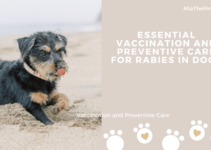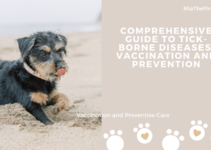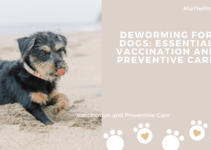Complete Dog Vaccination Schedule: Ensuring Optimal Preventive Care
As responsible pet owners, it is our duty to ensure the well-being of our furry companions. One crucial aspect of their healthcare is vaccination. Vaccines play a pivotal role in protecting dogs from various diseases and infections. In this article, we will delve into the importance of dog vaccinations, the core vaccines recommended for dogs, puppy and adult dog vaccination schedules, boosters and revaccination, as well as vaccine side effects and precautions.
Importance of Dog Vaccinations
Vaccinations are vital for dogs as they help prevent the onset of potentially life-threatening diseases. By stimulating the immune system, vaccines prepare dogs to fight off specific infections. These preventive measures not only safeguard individual dogs but also contribute to the overall well-being of the canine community by reducing the spread of contagious diseases.
Core Vaccines for Dogs
Core vaccines are considered essential for all dogs, regardless of their lifestyle or environment. These vaccines protect against highly contagious and potentially fatal diseases. The core vaccines typically include:
- Rabies
- Distemper
- Parvovirus
- Hepatitis
Administering these core vaccines to your dog is crucial to ensure their long-term health and well-being.
Puppy Vaccination Schedule
When it comes to puppies, vaccinations are especially important as their immune systems are still developing. A well-structured vaccination schedule is essential to provide them with the necessary protection. The typical puppy vaccination schedule includes multiple doses of vaccines, starting at around 6 to 8 weeks of age and continuing until they are 16 weeks old.
During this period, puppies receive vaccines against diseases such as distemper, parvovirus, adenovirus, and parainfluenza. It is essential to follow the recommended schedule provided by your veterinarian to ensure optimal protection for your furry friend.
Adult Dog Vaccination Schedule
Once dogs reach adulthood, they still require regular vaccinations to maintain their immunity. The adult dog vaccination schedule may vary depending on factors such as geographical location, lifestyle, and individual health needs. Core vaccines are generally administered every one to three years, while non-core vaccines may be given less frequently.
Consulting with your veterinarian is crucial to determine the appropriate vaccination schedule for your adult dog, taking into account their specific circumstances.
Boosters and Revaccination
Boosters and revaccination play a crucial role in ensuring the continued effectiveness of vaccines. Over time, the immunity provided by vaccines may decrease, making it necessary to administer booster shots. These boosters help strengthen the immune response and provide long-term protection against diseases.
Revaccination is the process of administering vaccines at regular intervals to maintain a dog’s immunity. Following the recommended booster and revaccination schedule is essential to ensure your dog remains protected throughout their life.
Vaccine Side Effects and Precautions
While vaccines are generally safe, some dogs may experience mild side effects such as lethargy, fever, or local swelling at the injection site. These side effects are usually temporary and resolve on their own. However, it is essential to monitor your dog after vaccination and consult your veterinarian if you have any concerns.
Precautions should be taken when vaccinating dogs with certain health conditions or those who have had previous adverse reactions to vaccines. Your veterinarian will guide you on the best approach to ensure the safety and well-being of your furry companion.
In conclusion, dog vaccinations are crucial for maintaining optimal preventive care. By understanding the importance of vaccinations, following appropriate schedules, and considering the individual needs of your dog, you can ensure their long and healthy life. Consult with your veterinarian to create a personalized vaccination plan that suits your dog’s specific requirements and provides them with the protection they deserve.
FAQs
What is the importance of dog vaccinations?
Dog vaccinations are important because they help prevent potentially life-threatening diseases and contribute to the overall well-being of the canine community by reducing the spread of contagious diseases.
What are the core vaccines recommended for dogs?
The core vaccines recommended for dogs include rabies, distemper, parvovirus, and hepatitis. These vaccines are considered essential for all dogs, regardless of their lifestyle or environment.
What is the vaccination schedule for puppies?
The typical vaccination schedule for puppies starts at around 6 to 8 weeks of age and continues until they are 16 weeks old. During this period, puppies receive vaccines against diseases such as distemper, parvovirus, adenovirus, and parainfluenza.
What is the vaccination schedule for adult dogs?
The vaccination schedule for adult dogs may vary depending on factors such as geographical location, lifestyle, and individual health needs. Core vaccines are generally administered every one to three years, while non-core vaccines may be given less frequently. Consult with your veterinarian to determine the appropriate schedule for your adult dog.
What are boosters and revaccination?
Boosters and revaccination are important for maintaining the effectiveness of vaccines. Boosters are additional doses of vaccines given to strengthen the immune response and provide long-term protection. Revaccination involves administering vaccines at regular intervals to maintain a dog’s immunity.
What are the side effects and precautions of dog vaccinations?
While vaccines are generally safe, some dogs may experience mild side effects such as lethargy, fever, or local swelling at the injection site. It is important to monitor your dog after vaccination and consult your veterinarian if you have any concerns. Precautions should be taken when vaccinating dogs with certain health conditions or previous adverse reactions to vaccines.



